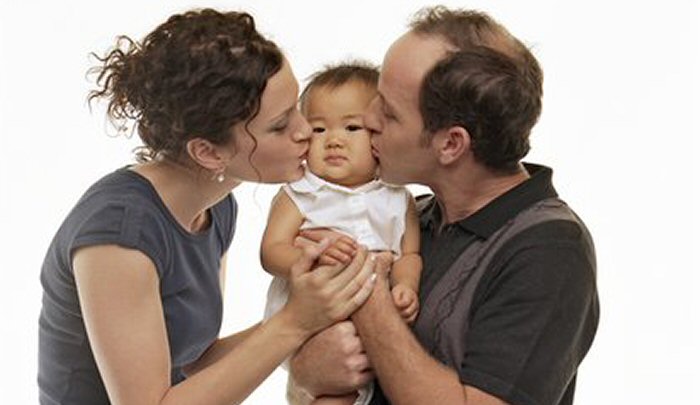■ The idea of adoption has changed over the last few decades from a last resort to a natural option in creating a family.
■ With the ease of travel many adoptions are from outside the US, blending not only a new family but also cultures and races as well. (known as transracial and transcultural adoption).
■ Adoption occurs for many reasons, such as the wish to expand families or to provide a home for children in need.
- o Kinship adoption may include grandparents adopting the children of their children.
- o More single people of both genders are adopting today than ever before, as are gay and lesbian couples.
■ The Decision to Adopt
- o If the choice is motivated by infertility many issues can accompany the choice.
◆ Feeling of loss
◆ Feeling of giving up on a dream
◆ Anxiety and fear about making this decision
◆ Stress related to how to go about adoption, how society will impact their decision, how their families and support systems will react.
- o The paper work alone can be overwhelming
- o Stress may affect a marriage if couples have different coping skills or if one is more ready to adopt than the other.
■ Foster Children
- o Being able to provide the appropriate medical, emotional, or academic support for foster children with special needs.
- o Prepared to suffer the potential loss of the relationship if child is returned to home or adopted by another family.
- o Stress of how to handle the child’s biological parents and family.
■ Parenting Adopted Children
o Address children’s questions about their adoption, about birth parents, and be able to prepare child for questions by others about their adoption.
o Any parent has to be aware of changes in behaviors that indicate an emotional struggle, such as:
- ◆ Social withdrawal
- ◆ In attentiveness that affects productivity at home or school
- ◆ Anger outbursts and temper tantrums
- ◆ Attachment anxiety, fear of being alone
- ◆ Changes in eating or sleeping patterns.
■ Role of Family Therapists
- o Help the family understand the impact of adoption on the family and the child
- o Work with the children who may have a hard time talking to adoptive parents about the adoption fearing it might show a sign of disloyalty or being unappreciative.
- o Normalizing the feelings of wanting to learn about their biological parents and the reasons why they were put up for adoption.
- o Work with the biological children in the family giving them a place to explore their feelings about the adoption.
- o With the adjustment to new relationships, the family therapist can ensure positive communication and creating appropriate boundaries to benefit the children and strengthen the family.
SocialWorkExam.com offers online prep for NASW. Unlimited access to practice exams, case studies, simulations, video, audio, and flash cards 24/7.
■ The idea of adoption has changed over the last few decades from a last resort to a natural option in creating a family.
■ With the ease of travel many adoptions are from outside the US, blending not only a new family but also cultures and races as well. (known as transracial and transcultural adoption).
■ Adoption occurs for many reasons, such as the wish to expand families or to provide a home for children in need.
- o Kinship adoption may include grandparents adopting the children of their children.
- o More single people of both genders are adopting today than ever before, as are gay and lesbian couples.
■ The Decision to Adopt
- o If the choice is motivated by infertility many issues can accompany the choice.
◆ Feeling of loss
◆ Feeling of giving up on a dream
◆ Anxiety and fear about making this decision
◆ Stress related to how to go about adoption, how society will impact their decision, how their families and support systems will react.
- o The paper work alone can be overwhelming
- o Stress may affect a marriage if couples have different coping skills or if one is more ready to adopt than the other.
■ Foster Children
- o Being able to provide the appropriate medical, emotional, or academic support for foster children with special needs.
- o Prepared to suffer the potential loss of the relationship if child is returned to home or adopted by another family.
- o Stress of how to handle the child’s biological parents and family.
■ Parenting Adopted Children
o Address children’s questions about their adoption, about birth parents, and be able to prepare child for questions by others about their adoption.
o Any parent has to be aware of changes in behaviors that indicate an emotional struggle, such as:
- ◆ Social withdrawal
- ◆ In attentiveness that affects productivity at home or school
- ◆ Anger outbursts and temper tantrums
- ◆ Attachment anxiety, fear of being alone
- ◆ Changes in eating or sleeping patterns.
■ Role of Family Therapists
- o Help the family understand the impact of adoption on the family and the child
- o Work with the children who may have a hard time talking to adoptive parents about the adoption fearing it might show a sign of disloyalty or being unappreciative.
- o Normalizing the feelings of wanting to learn about their biological parents and the reasons why they were put up for adoption.
- o Work with the biological children in the family giving them a place to explore their feelings about the adoption.
- o With the adjustment to new relationships, the family therapist can ensure positive communication and creating appropriate boundaries to benefit the children and strengthen the family.
SocialWorkExam.com offers online prep for NASW. Unlimited access to practice exams, case studies, simulations, video, audio, and flash cards 24/7.

No comments:
Post a Comment